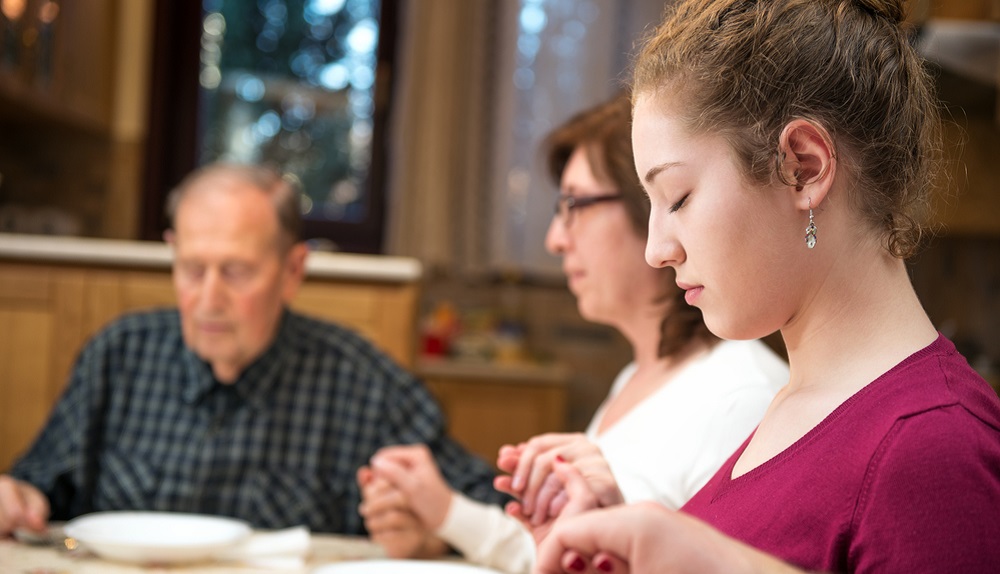To deal with the most upsetting kind of daily stress, let the saints be your guide.
Lenten Campaign 2025
This content is free of charge, as are all our articles.
Support us with a donation that is tax-deductible and enable us to continue to reach millions of readers.
We love our families, but sometimes things can get tense in our closest relationships. How can we manage those everyday stressful times and maintain well-being in our homes?
Here are eight hacks to a happier home life from saints who can teach us a lot about how to manage our negative feelings and restore frayed relationships.
Speak kindly
St. John Bosco said: “Sweetness in speaking, acting, and rebuking wins everything and everyone.” It is amazing how a little kindness helps create harmony in the home.
When someone makes a mistake, we need warm-heartedness and positive words to correct it and repair the damage.

Positive reinforcement allows us to connect with others and give them security. The saint also advises us: “Never reprimand your brothers or humiliate them in the presence of others, but always correct them ‘in camera caritatis’ — that is, sweetly and only in private.”
Smile frequently
Mother Teresa said that “peace begins with a smile.” When we smile often, we can create a natural habit that helps us and also lightens others’ burden.
Smiling can be a challenge, but it is an act of generosity to make others’ lives more pleasant. It requires us to come out of ourselves and leave our self-centeredness behind.

The saint reminds us of this daily task: “Start each day with a smile, even if you didn’t get a good night’s sleep. A smile can change your luck and that of the people you meet during the day.”
Share needs
St. John Paul II said, “Love will be a ferment of peace when people feel others’ needs as if they were their own and share with them what they have, starting with the values of the spirit.”
Sometimes we see only our own needs, opinions, and judgments, without taking into account that the people around us also have theirs.
To fight family stress, we need to achieve a balance between what we want and what others want, between what we both need and what allows us to have well-being.

To do so, we need to create and maintain a spirit of community, knowing that we all need something and that we also have something to offer. Being participatory and making an effort to get to know the people around us can enable us to build opportunities and move forward together.
Ask for forgiveness and forgive quickly
St. John Paul II said, “Don’t waste your time holding a grudge. Let it go immediately and continue with a loving relationship. We must forgive always, remembering that we ourselves have needed forgiveness.”
Pride has no place in a peaceful home. We need to be able to apologize easily and ask for forgiveness. In fact, what normally happens is that we need to be forgiven much more than we forgive others.
Humility is the truth about oneself: it allows us to know our strengths and also our weaknesses objectively. This awareness of our own weaknesses is what motivates us to have mercy on others.
People sometimes misunderstand forgiveness by reducing it to an emotion, but Mother Teresa said, “Forgiveness is not a feeling but a voluntary action.” You can forgive while crying in pain over what someone did to you.
Forgiveness is the voluntary act of not hating, not returning evil for evil, not remaining resentful or cultivating anger over what you suffered. It also means not taking revenge. And that means choosing to “make peace” with others.
And although forgiveness does not immediately heal spiritual wounds, it restores the circuits of love that have a healing effect over time. As Mother Teresa said: “Forgive. By forgiving, you will have your soul in peace and so will the one who offended you.”
Be patient in love
Mother Teresa said: “When you give someone your love, you are never sure that they will love you back. Do not expect them to love you back; just wait for love to grow in the other person’s heart, but if it doesn’t grow, be happy because it grew in yours.”
There are things that we would love to hear, but that we may never hear others say. However, this saint encourages us not to stay in that feeling of emptiness, and to take another step to persevere in love.
Every act of true love has an impact on the heart sooner or later, so the language of love that people use isn’t necessarily verbal. We need to know how to wait and learn to listen!

Patience generates peace. When we remain in the love that is patient we give an affective loan to the other. How much time would we like them to give us? Surely the answer we expect is: forever, with no expiration period.
The main cause of emotional fatigue is investing a lot and getting very little in return. Sometimes we give up many things to take care of our parents, to make our partners happy, and to give the best to our children.
To cope with family stress and emotional fatigue, we must fill our day with acts full of love. When we put love into what we do, we invest in others but also in ourselves; we become instruments of peace.
Share quality time
St. John Paul II spent some of his time taking groups of young people to the mountain to ski or hike. He was always looking for an special time to talk to them, listen to them, and share his experiences and knowledge.
One way to fight family stress is to “disconnect,” to change routines and break the usual habits that can lead to a sense of burden, tiredness, or reproach.
How much quality time do we share as a family? Try to do new things. Go on a trip or take a hike. Breaking up the usual routines is a great way to cope with stress and even talk about important issues in a different and more relaxed context.

Give lots of hugs
St. Paul asked the Christians to “Greet all the brothers with a holy kiss” (cf. 1 Thessalonians 5:26). A holy kiss is synonymous with a hug today: it’s a warm, friendly, and respectful gesture of unity and loving consideration.
Paul repeats the suggestion to four other communities, as Peter does when he asks his followers to “greet one another with a kiss of Christian love.” In fact, the kiss of peace in the Mass comes from this ancient tradition.

An embrace is a sign of peace, a way of greeting from the heart. When we don’t know what words to use, a hug can speak for us. Give your little ones a squeeze. Wrap your arms around your big children. Your spouse probably could also be needing a hug even if he or she doesn’t ask for it!
Hugs are also a very effective medicine. Hugging for just 20 seconds reduces blood pressure and increases oxytocin, a hormone that relieves stress. Hugging frequently reduces the risk of heart disease… and everyone knows that hugging makes babies — and adults — cry less.
Pray daily
St. John Paul II said: “Ask God to bring peace to your home. Lift up the needs of the day.”
If we are to give peace, we need to live it in our hearts and know how to ask for it. God never abandons us, much less in difficult times.

When we give God a privileged place in our home, we can come to understand his love and overcome feelings of discouragement and sadness. He brings joy and fills us with strength to cope with stressful situations.
Mother Teresa said, “Joy is prayer, the sign of our generosity, our detachment, and our inner union with God.”

Read more:
Stressed and overwhelmed? Try this little hack throughout the day

Read more:
How to defuse a child’s tantrum with one question








